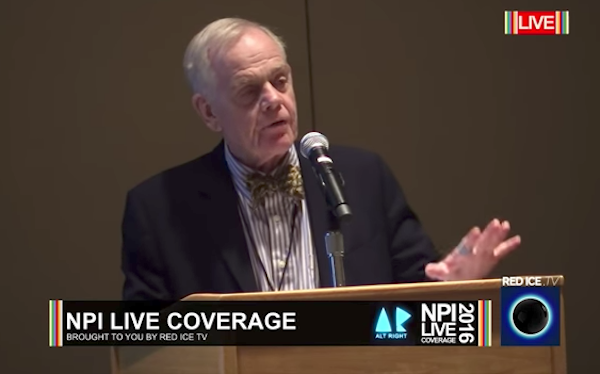
A white nationalist rally in Charlottesville, Va., in May.Allison Wrabel/The Daily Progress/AP
This story was produced by Reveal from The Center for Investigative Reporting.
Long before Donald Trump’s election ushered in an era of resurgent white nationalism, a disaffected Republican named William H. Regnery II was brooding about the demographic plight of white people and plotting their rescue. Like Trump more than 20 years later, Regnery, the wealthy scion of a famous GOP family, had an increasingly dark view of a changing America: As he wrote, the United States had become a crime-ridden society with bad schools, high taxes, an intrusive government, and a penchant for political correctness that was “morphing into an intellectual tyranny.”
Worse, “a flood of immigrants were changing the look of America from a palette (sic) of prime colors to a third-world monochrome,” he wrote in a rant that would be at home on the bookshelf of Trump’s chief strategist, Steve Bannon. “Instead of a lingua franca, the country clanged with many foreign tongues.”
By 1999, Regnery had come to believe that the only future for white people in North America was a reconfigured continent with a white-only homeland carved out of the former United States. He began consorting with Ku Klux Klan apologists, Holocaust deniers, eugenics boosters, and immigration foes. He set up two white nationalist nonprofits and steered money into them. He published fringe-right journals and books. Through his family’s famed conservative publishing house, Regnery had been on a first-name basis with the cream of the Republican establishment. But by 2006, his public views on race left him ostracized from the GOP.
Now, he’s back. Working behind the scenes, the retired Chicago business executive has played an important role in making his ultra-right views a part of America’s political conversation in the era of Trump. In what he has described as his crowning political achievement, Regnery discovered Richard Spencer, the mediagenic agitator who invented the term “alt-right.” In 2011, Regnery made him the frontman for his white nationalist think tank, the National Policy Institute, providing Spencer the platform to launch the alt-right movement.
Fast-forward to 2016. As the Trump campaign gained momentum, Spencer, with Regnery’s support, emerged as the omnipresent face of the American far right: a glib talking head whose views on issues of immigration and race at times seemed only slightly more extreme than what you could read on Breitbart News—or hear from Trump himself.
Turn on the TV or go online, and there was Spencer: holding forth on white identity politics on yet another talk show; crying, “Hail Trump!” in a fiery post-election speech; getting sucker-punched by a leftist demonstrator at Trump’s inauguration; and, most recently, leading a torchlight march to protest the planned removal of a Confederate monument in Charlottesville, Virginia.

Regnery speaking at an NPI event after Trump’s election.
Screen shot
Regnery has played a “vitally important and indispensable” role in building the alt-right movement, Spencer said in an interview. He has provided substantial donations and big-picture advice, Spencer said. They talk every week, sometimes every day. “I don’t think I would do a big thing without consulting him,” Spencer said.
Regnery, 76, declined to be interviewed. But in public, he has expressed delight with Spencer for leveraging Trump’s election to obtain a flood of media attention for his extremist views. As Regnery told white nationalists at the Washington, DC, conference he hosted in the days after Trump’s election, he believes his place in history has been secured by the simple decision to put Spencer in charge.
“I am now persuaded that with your courage,” he said, “the alt-right side of history will prevail.”
Just one year before Trump began running for president, Spencer and Regnery were struggling to jump-start their political movement. In 2014, they planned to convene what they called a European Congress of the white nationalist movement. When they descended on Budapest, Hungary, the result was chaos and humiliation.
According to their plan, the grand imperial facades of the Hungarian capital would be the backdrop for an international conference of white “racial realists” in a Europe roiled by waves of refugees fleeing the Middle East. Regnery, Spencer, and Jared Taylor, the self-described “racialist” editor of a white nationalist website, were scheduled to speak. Joining the Americans on the podium would be a Russian fascist known as “Putin’s brain”—Alexander Dugin, an adviser to Russian President Vladimir Putin.
No heat was anticipated from the government: Hungarian voters had just handed another supermajority to the European Union’s most right-wing leader, Prime Minister Viktor Orbán, a Putin ally. But it all unraveled. The Hungarian Interior Ministry banned the event, declaring it openly racist. Regnery was intercepted at Budapest’s Ferenc Liszt Airport, held overnight and deported. Dugin was denied an entry visa. Spencer entered the country by train, then was picked up in a police raid and handed over to immigration authorities.
“The government thought that it was a CIA plot,” a source with inside knowledge of Hungarian counterintelligence said in an interview. “They are completely paranoid, and when this conference was announced, they were convinced that this was an American action,” the source said. “They guessed that US intelligence services set up this conference so they can say Hungary is a home for right-wing extremist activists and then blackmail them in the international media.”
It was a preposterous suspicion, given Regnery’s own profound alienation from his homeland’s political establishment. The Regnery family’s political story starts with his grandfather and namesake, William H. Regnery, a Chicago textile magnate. He was a New Deal Democrat, but in 1940 he helped found the right-wing America First Committee, which sought to stop the United States from going to war against Nazi Germany. The committee, which attracted Nazi sympathizers and anti-Semites, disbanded when Japan attacked Pearl Harbor.
The America First name, meanwhile, has experienced a renaissance as one of Trump’s leading mottos for his presidency.
After World War II, Regnery’s uncle, Henry Regnery, made the family a power in GOP politics through his publishing house, which was subsidized by inherited wealth. He printed the works of writers whom he called “giants of American conservatism:” William F. Buckley Jr. (“God and Man at Yale”), Russell Kirk (“The Conservative Mind”), and Robert Welch, co-founder of the John Birch Society. Regnery books—anti-communist, anti-big-government and pro-business—helped define what it meant to be a Republican in postwar America. Upon his death in 1996, he was eulogized as “the godfather of modern conservatism.”
William Regnery II’s cousin, Alfred Regnery, was an official in the Reagan administration’s Justice Department and then became president of Regnery Publishing. The imprint still exists, under new ownership: Among its recent best-selling authors are Ann Coulter (Adios, America!) and Trump (Time to Get Tough). Regnery himself plunged into conservative politics at the University of Pennsylvania in the early 1960s. As he wrote in his 2015 memoir, Left Behind, he joined the Intercollegiate Studies Institute, a nonprofit set up to recruit Republican activists on college campuses. His family helped endow the institute, and Regnery remained involved for more than 40 years. On the institute’s board, he associated with GOP stalwarts, including former US Attorney General Edwin Meese, Heritage Foundation President Edwin Feulner, and Buckley, founder of the National Review.
After college, Regnery worked in the family textile business. Court records show he was forced to resign as president in 1981 when the firm ran into financial trouble. After that, he grew disenchanted with the GOP, running for Illinois secretary of state in 1994 on the ticket of the fringe Term Limits & Tax Limits Party.
In his memoir, Regnery dated his alienation to a 1993 meeting of the conservative Philadelphia Society. Speakers were celebrating the collapse of world communism and the rise of free-market economies worldwide—triumphs of American conservatism in the age of Ronald Reagan, as they saw it. For Regnery, there was little to celebrate: He feared that the wave of nonwhite immigration that was swamping America would surely doom white people to minority status and impotence.
In a 1999 speech at a right-wing conference in St. Pete Beach, Florida, Regnery went public with his racial fears. White couples weren’t having enough babies, he declared, and the government was allowing in hordes of nonwhite immigrants “as if to hasten our demise.” His solution: a reconfigured continent broken up into separate racial and religious enclaves.
Soon after that, Regnery founded a nonprofit dedicated to providing “a cultural home for our children’s children,” as he wrote in a founder’s statement. It was called the Charles Martel Society, commemorating an 8th-century Frankish king who turned back an Arab invasion—and thus, in the view of white supremacists, saved European civilization almost before it began. Regnery packed the society’s board with men who shared his racial concerns. They included the late Sam Francis, a former Washington Times columnist who suggested that white people could solve racial problems by “imposing adequate fertility controls on nonwhites.”
“Feel confident identifying as white” became the motto of the Martel Society’s magazine, the Occidental Quarterly. Its editor, Kevin MacDonald, has written that American Jews are allied with African Americans and Latinos to promote “a suicidal wave of non-White immigration” into the United States.
Last year, the Occidental Observer website published a book review asserting that the Treblinka concentration camp was “anything but an efficient apparatus” for killing Jews. (The review was taken down.) Recent articles in the Occidental Quarterly have titles such as “The Case for Eugenics in a Nutshell,” and “Donald Trump’s Candidacy Is a Game Changer—People Are Waking Up.”
The society spends about $190,000 per year, tax returns show. Nonprofits are not required to identify donors, so money from Regnery isn’t noted. But Regnery also served on the board of a charity associated with the family’s textile business, and over the years that nonprofit has donated about $85,000 to the Martel Society, records show.
In 2004, perhaps looking to expand the Martel Society’s reach, Regnery told Occidental Quarterly subscribers that, for the “survival of our race,” he was setting up a dating website for “heterosexual whites of Christian cultural heritage.”
But he didn’t follow through. The following year, using $380,000 from the Martel Society, Regnery established the think tank that would eventually bring a notorious white nationalist to prominence alongside the rise of Trump.

Courtesy of Daniel Lombroso/The Atlantic
In 2005, the National Policy Institute promised in a press release to research how white people were being harmed by affirmative action, illegal immigration, and the Southern Poverty Law Center, the civil rights nonprofit that has called both the Martel Society and the institute “active hate groups.” The institute publishes books and reports, some of them touted as academic studies. Regnery himself co-wrote a study predicting that in the 21st century, the world’s population of “blacks or sub-Saharan Africans” would explode, while the percentage of white people would drop to single digits. Like the Martel Society, the institute was a low-budget operation, spending about $170,000 per year, according to tax documents. In addition to the cash from the Martel Society, it obtained about $90,000 from Regnery’s family foundation. The Pioneer Fund, a nonprofit founded in the 1930s by promoters of the eugenics movement, has donated about $30,000, records show.
Even as his politics drifted to the edge, Regnery still had ties to mainstream conservatism through his work on the board of the Intercollegiate Studies Institute, the organization he joined in college. The final break came in 2006, after he gave yet another racially charged talk about immigration and demographics, this time in Chicago.
“The white race may go from master of the universe to an anthropological curiosity,” he warned the audience. Later he remarked, “Whites are unique in welcoming racial aliens into their midst.”
As Regnery recounted in his memoir, an anonymous letter alerted the institute that Regnery was “promoting people and ideas of the most vile nature.” Fearing scandal, the institute asked Regnery to resign. When he refused, he was voted off the board, with such GOP luminaries as former attorney general Meese and the Heritage Foundation’s Feulner supporting his ouster. His cousin, the former Reagan official, abstained.
Aggrieved, Regnery blamed “the velvet tyranny of political correctness” for his expulsion. It was all the more painful because he had known the people who voted against him for decades.
Until 2010, Regnery relied on Louis Andrews to run his National Policy Institute. A retired mortgage broker, Andrews believed public school for most black children should end after eighth grade because they couldn’t benefit from it. When Andrews became gravely ill with cancer, Regnery turned to a young right-winger he had met at a private event the previous year: Richard Spencer.
Like Regnery, Spencer was a child of privilege. His father was a wealthy physician in Dallas, and, as Reveal has reported, through inheritance Spencer is part owner of Louisiana cotton fields worth millions of dollars.
Spencer had received an expensive liberal arts education. His last academic stop was Duke University, where he pursued a Ph.D. in European intellectual history—and where, as he told Mother Jones, he was radicalized by reading white nationalist literature. In 2007, Spencer dropped out of Duke “to pursue a life of thought-crime,” as he put it. He worked briefly at the American Conservative, a journal co-founded by former Richard Nixon aide Pat Buchanan, and then was managing editor of a libertarian website published by a jet-setting heir to a Greek shipping fortune. Later, he set up his own site, AlternativeRight.com.
Spencer said he told Regnery that he hoped to use the National Policy Institute to “make a dramatic break from the conservative movement” by emphasizing white identity politics. After Spencer took over, he moved the think tank’s headquarters to his mother’s luxury home near a ski resort in Whitefish, Montana. Spencer drew no salary from the institute for his first two years. In 2014, the year of the abortive Budapest conference, his annual pay was $7,900.
Especially after the disappointment of Budapest, there was little reason to believe that alt-right ideology as pushed by the National Policy Institute would break out into the mainstream. But as Spencer recognized, Trump’s emergence as a presidential candidate prefigured a “paradigmatic shift” in American politics.
Trump’s views on immigration—calling Mexican immigrants killers and rapists, vowing a ban on Muslims—tracked with alt-right rhetoric. He even retweeted posts by a white supremacist with the handle WhiteGenocideTM. His campaign director was Bannon, the Breitbart executive who had declared that his news service was “the platform for the alt-right.”
When political reporters, seeking to understand this new phenomenon, reached out for comment from the alt-right, Spencer was happy to help. In his writing and public statements, Spencer has seemed in perfect sync with Regnery’s nightmare vision of an endangered white minority—and with Regnery’s dream of creating a white North American homeland.
“By 2042—if nothing else changes—white people will become a minority,” Spencer told Reveal last year. “Also, the majority of births right now are actually to non-white people. So there is a dramatic transformation taking place.”
As to the white homeland, he said, “What the ethnostate is, is an ideal…a new type of society that would actually be a homeland for all white people.”
Freelance reporter Dan Nolan contributed to this story from Budapest. It was edited by Andrew Donohue.












